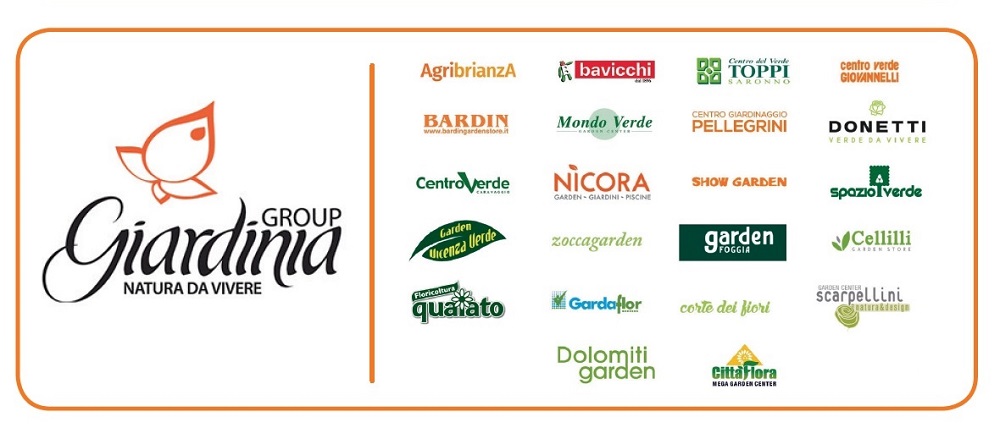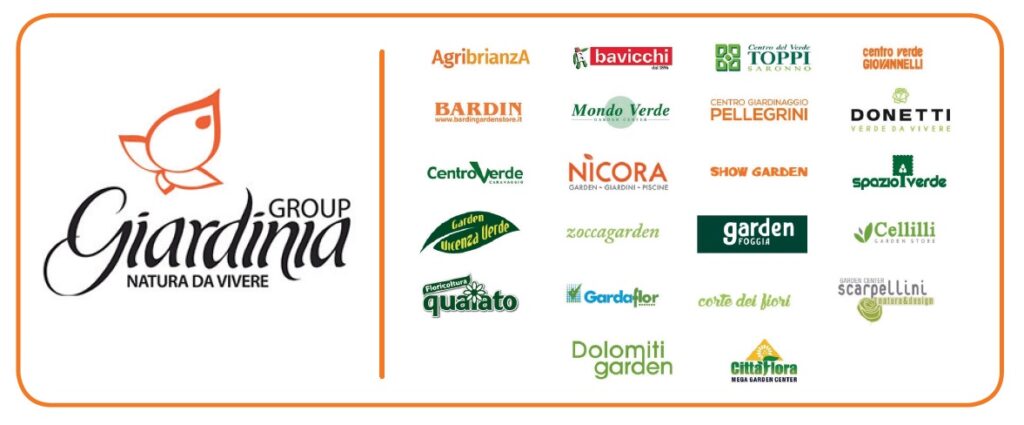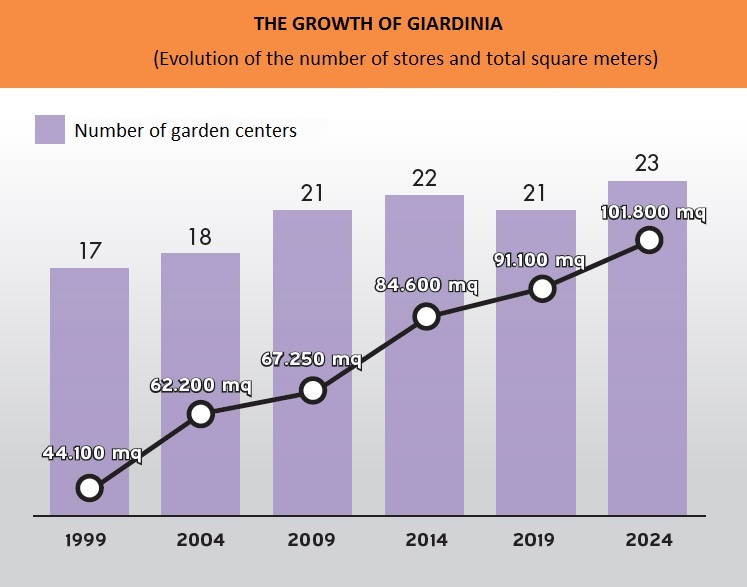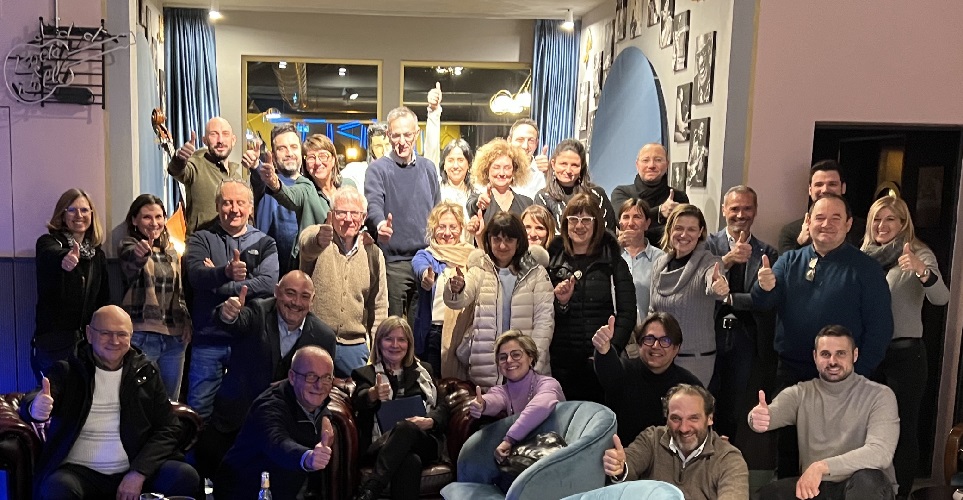25 years of the consortium of independent garden centers Giardinia
Giardinia, the consortium of independent garden centers, was founded 25 years ago, but its roots can be traced back to the early 1990s when retailer associations in the gardening market were virtually nonexistent. We spoke with Carlo Teruzzi and Ugo Toppi, president and historical founder of Giardinia, respectively.
On February 4, 1999, 25 years ago, Giardinia was founded. Starting from the pioneering experience of its 5 founding members, the consortium has grown to include 6 members and 16 associates today, with 23 retail outlets and a total exhibition area of approximately 102,000 square meters. This is an example of retailer association that has managed to overcome the difficulties of the past twenty-five years and has found the resources to face the most important challenges precisely in its cohesion.
However, the project has its roots a few years earlier, on April 1, 1993, when the Consorzio Centri Giardinaggio was founded, of which Giardinia represents an evolution. A project of association between retailers that was truly avant-garde at the time, as it was precisely at the beginning of the 1990s that the first examples of affiliation between retailers specialized in the DIY-garden market emerged: the first Bricocenter and Brico io in franchising opened between 1989 and 1990 and at that time the only existing consortium was Punto Legno, specialized in DIY. There was no internet and huge car phones had just appeared, which we would only call “smartphones” from 1997.
The history of affiliation projects between retailers sees, by its nature, the alternation of different associates who over the decades have contributed to the evolution of the group and for many reasons have moved away. The evolution of 1999 transformed the first consortium, which was predominantly Lombard, into a national reality. Today’s Giardinia is very different from the Consorzio Centri Giardinaggio of 1993.
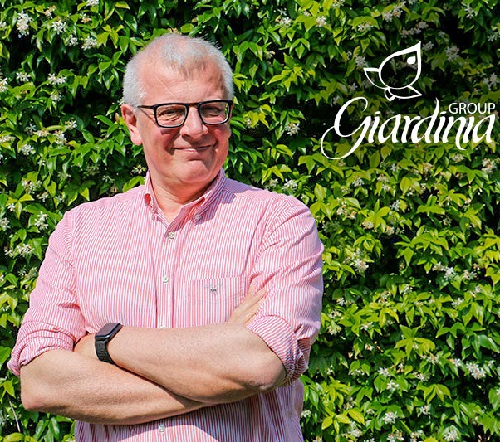
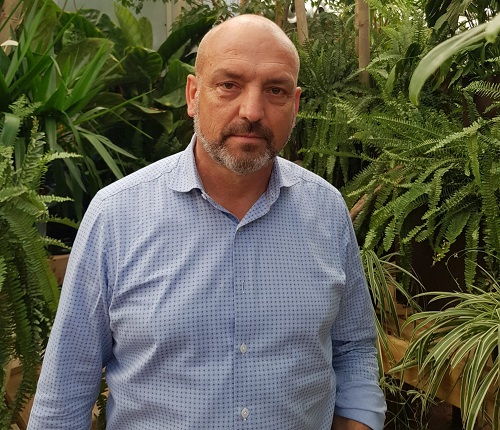
1993-2024: The evolution of the consortium
Buyer Point: How did the idea for the Garden Center Consortium arise in 1993?
Ugo Toppi: The idea came from Gianfranco Binda (recently deceased – ed): I met him when he was a representative for Galaxy by Ruffoni, later becoming Gardena Italia. He was a multi-mandate holder and managed other important gardening brands: a historic manager, esteemed and known by all the most important garden centers that sold Gardena in Lombardy. Gianfranco Binda contributed to the creation of a market that did not exist.
Carlo Teruzzi: Gianfranco Binda was a reference point for gardening in Lombardy. If Giardinia exists, it owes a great deal to Gianfranco: there is no doubt about it. Thanks to his role as an agent, he knew many garden centers and his work was fundamental in making us known.
Ugo Toppi: Gianfranco told me about the project to create a consortium during a trip to Belgium, which was followed by some meetings. In addition to me, among the founding members of the Garden Center Consortium there were Jimmy Pignatelli of Giardineria, who then had Vivai Flora of Magenta, Giuseppe Elvini of Linea Verde of Bergamo, Flora of Lentate, Seme Fiorito of Buccinasco and Gervasini of Varese who also controlled the garden center Il Seminatore in Milan. Seven points of sale and Gianfranco Binda as coordinator.
Buyer Point: In 1993, the internet practically didn’t exist, and finding new associates couldn’t have been easy. Even the concept of a “garden center” wasn’t as defined as it is today…
Ugo Toppi: It wasn’t easy. Even looking at the names of the founders, there were big differences between us, both in terms of management and vision. I remember that Jimmy Pignatelli had a completely different pace, due to his professional figure and the size of his company. I still remember an invitation he gave us then, because it was what I thought too, although maybe not so clearly: “we think about buying together, but we should learn to sell together: as a consequence, everything else comes”. He was right: it’s fundamental to have common assortments in multiple points of sale to obtain economies of scale.
However, thanks to the management of Gianfranco Binda, who personally knew many entrepreneurs, we managed to find new affiliates. But to do some numbers, we welcomed everyone, without evaluating too deeply. During a meeting of Assogarden, the Roman association that at the time brought together garden centers, we proposed an “observation fee” to allow garden centers throughout Italy to discover our objectives and procedures. On that occasion, we met Graziano Giovannelli from Massa, Dario Bavicchi from Perugia and Carlo Teruzzi from Agri Brianza. In that period, we realized that we could do something more and transform a mainly Lombard consortium into a national one. Above all, it was an opportunity to clarify things, which led to the birth of Giardinia.
Buyer Point: How was the consortium of independent garden centers Giardinia born in 1999?
Ugo Toppi: Some members preferred to make their shares available, which were divided among the new members Dario Bavicchi, Carlo Teruzzi and Graziano Giovannelli, who joined me and Giuseppe Elvini of Linea Verde.
It was also an opportunity to abandon the rather generic name “Consorzio Centri Giardinaggio” and choose a more precise identity. The name Giardinia was liked, even if it reminds me of Topolinia.
The birth of Giardinia allowed us above all to open the consortium to other associates, who together with the members participate in purchases and contribute to creating volumes. In this way, the affiliate does not bear the costs and risks of the consortium and only pays a fee that is amply repaid by the various discounts and imports.
Compared to these five founding members, for different reasons Giovannelli and Elvini left over time and their shares were purchased by Mondo Verde (of Taneto di Gattico, in the province of Reggio Emilia – ed), Bardin Garden Center (Villorba, TV – ed) and Pellegrini Garden (Sant’Elpidio al Mare, FM – ed). Today we are six members and 16 associates.
Buyer Point: What prompted you to move from affiliate to partner?
Carlo Teruzzi: The fact of believing in the project. I have always seen the association in retail as a very, very intelligent potential: in particular, the possibility of collaborating with colleagues and therefore growing together. I immediately joined as an associate and when Giardinia was born, I acquired the shares of a departing member, together with Giovannelli and Bavicchi. I have always believed in it a lot and in fact, as soon as there was the possibility of becoming a partner of Giardinia, I seized the opportunity.
Buyer Point: Graziano Giovannelli left us prematurely but left an indelible mark on Giardinia and the entire sector: he was also one of the promoters of Promogiardinaggio and Aicg…
Carlo Teruzzi: At the beginning, Graziano, together with Elvini, were a bit the soul and engine of Giardinia. Thanks to their work, Giardinia has taken many steps forward. Graziano taught us a lot.
Ugo Toppi: Graziano was first and foremost a friend and expanded Giardinia’s vision of the market thanks to his innovations and ideas. In 1999, when the association between retailers was in its infancy, he took me to Holland to meet the purchasing director of Intratuin, a franchise chain composed of independent entrepreneurs that had many similarities with Giardinia. Then we took a different path, compared to the franchise chain, and moved on to the consortium and the purchasing group. So working together to obtain good purchasing conditions in order to be more competitive.
The Giardinia Consortium: Beyond a buying group
Buyer Point: Modern consortia are born to import from the Far East. But in the Nineties, globalization didn’t exist yet. How did you work back then?
Ugo Toppi: With the Garden Center Consortium, we only dealt with discounts with Italian suppliers and the first imports of Giardinia were fundamentally with large European importers, German and Dutch. Globalization arrived ten years later. The very first import from China was trees and garlands from Oncor. They cost so little that we were prepared for disappointment: instead, everything went well and we still work with them today.
The first time we went to Christmasworld in Frankfurt we were scared. They told us “we only work with wholesalers” or they put us in front of certain quantities and a single invoice, impossible conditions for us. It was a different market, the same garden centers were then at the beginning with Christmas.
Carlo Teruzzi: Practically, Christmas didn’t exist in garden centers. It was Jimmy Pignatelli who first proposed this development: he was a member of Giardinia and was a bit ahead of us and studied foreign markets. He was the one who suggested the Christmas business and with Giardinia we organized a first exhibition in collaboration with Galvas. The first tests went well and we all continued, some even in an important way like Mondo Verde. I confirm that the first time at Christmasworld in Frankfurt we looked like Totò and Peppino in Milan!
Buyer Point: Being part of a retailers’ consortium means losing a bit of “power” over your own store, starting with purchases. Is it a problem?
Carlo Teruzzi: I don’t agree: it’s not a “loss of power” but an enrichment. The first advantage of a reality like the Giardinia consortium is certainly the exchange of ideas, considerations, numbers and the possibility of broadening your horizon.
Among our affiliates there are many excellences in different sectors: if you don’t stop at “we’ve always done it this way” or “in my area it doesn’t work” and try to overcome this limit, you have all the tools to improve and understand why your colleague performs better. Maybe it’s because of how he displays products? Or how he buys? Among us there is the utmost confidence and it’s an amazing enrichment to have at your disposal free and open entrepreneurs.
For us it was like this: Agri Brianza was a very technical company, it didn’t come from the garden center world like the others, so we were completely ignorant about some product families, such as decoration, garden furniture and fragrances. We brought our experience in motor cultivation, but thanks to Giardinia we were able to work alongside professionals who opened the doors to other markets for us. If today Agri Brianza is strong in some sectors, such as Christmas, garden furniture or barbecues, it is precisely thanks to the help of Pignatelli, Elvini and Giovannelli. The Christmas of Mondo Verde di Reggio Emilia exists thanks to Giardinia: then they put their own touch on it and created a unique event in Italy. Today I see the same enthusiasm in the young people, in the new associates who have joined this adventure with us and are putting themselves on the line.
Ugo Toppi: There are those who are better with machines, those with furnishings, those with plants. I agree with Carlo, the real advantage of Giardinia is not the purchases but the possibility of participating and sharing one’s ideas and experiences. To understand how to improve ourselves, also thanks to the experimentation and research of other colleagues. Regarding the “loss of power”, it is obvious that interrupting relations with old suppliers is difficult and Giardinia does not impose assortments. We have divided suppliers into bands: those in band A have 100% coverage of stores and we are not talking about a few brands. For others it is more difficult.
Buyer Point: Have you experimented with private labels?
Ugo Toppi: We have produced Giardinia-branded potting soils with Vigorplant and fertilizers with Ekla. But it’s not easy to impose a private label on associates.
Carlo Teruzzi: Nobody notices, but we have many exclusive Giardinia-branded products: they are the Christmas and furniture products. Imported products are often judged to be second-rate, but that’s not our case. We have a very deep knowledge of products and the offer and we are working particularly on materials and fabrics: the products we import are not random, but the result of a very careful study and selection, to obtain quality products at a fair price.
In the last Giardinia meetings, the need to create two brands for Christmas and outdoor furniture emerged. Most of the garden furniture on the market is imported: we manage to have high-quality products at very competitive prices.
Buyer Point: An exclusive outdoor line is also a way to avoid price comparison with e-commerce?
Carlo Teruzzi: Yes, we differentiate our offer from e-commerce wherever we can. For this reason, I’m not very fond of private labels on commercial products, such as potting soils or fertilizers. I don’t see the need for it at the moment. I understand for a chain, but what’s the point for a group like Giardinia to have a commercially branded potting soil when there are well-known and established brands? A private label also involves large volumes, so you would then have to “force” the associates to purchase the branded products.
A consortium open to everyone
Buyer Point: Are you interested in expanding your affiliates? What characteristics must a garden center have to join Giardinia?
Ugo Toppi: We don’t have any particular limits, other than the “buffer zone” of the other associates. It must be a minimally structured garden center, to avoid problems in managing quantity purchases. Fundamentally, it must participate in the life of Giardinia, which is not only made up of purchases, but also of assemblies, meetings, exchanges of ideas and continuous comparison.
Carlo Teruzzi: We are always interested in evaluating new proposals. The “size” of the store or the company is not important, but rather the desire to grow: we have known many of our associates “since they were small” and in these 25 years they have grown and opened new and large garden centers. I’m thinking of Bavicchi (he inserted the production greenhouse in 2005 – ed), Bardin or Pellegrini (both opened new garden centers in 2017 – ed).

